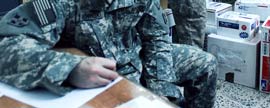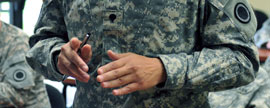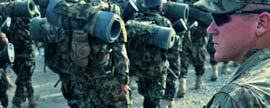This following is an Extract from the Book Guidebook for the Young Officer
How do I relate to my platoon sergeant?
This question also begets a few comments of philosophy before directly addressing the issue. Leader-subordinate relationships have been endlessly researched. Best-sellers come out every year addressing the “latest” and “best” approach to motivating and guiding one’s subordinates. But I can simplify situational leadership by adopting four different approaches, depending on the type of followers that work for you. My four categories of subordinates are—
- Type 1: Highly motivated with a gifted cognitive ability.
- Type 2: Highly motivated with little to average talent.
- Type 3: Poorly motivated with a gifted cognitive ability.
- Type 4: Poorly motivated with little ability.
What Type is Your Platoon Sergeant?
The first requirement is to determine which of the four types most closely matches your platoon sergeant. Once you’ve made an assessment, act according to that type. My guidance on how to interact with each type is cited below:
Type 1: Highly Motivated with a Gifted Cognitive Ability
If you happen to have a Type 1 platoon sergeant, you are blessed. Give this platoon sergeant general guidance about the standards you expect. Give him the leeway to prepare and train the platoon while you participate and inspect. Yes, inspect. Good platoon sergeants want the platoon leader to inspect the troops in garrison, the motor pool and the field.
How often have you run into gifted individuals that also have the drive to be the best. In sports, Michael Jordan and Lebron James come to mind. These two athletes have been or are currently at the top of their profession. These gifted athletes work hard in practice and in every minute of every game. Trust me. There are NCOs with incredible talent and drive. SSG Harden was such an NCO in my second command. Harden had a physical presence about him that was both intimidating and comforting. He demanded and received respect from soldiers and NCOs alike. He wasn’t arrogant, just confident. He knew his job and those around and above him. I promoted SSG Harden to Platoon Sergeant over more senior NCOs. That didn’t sit well with several NCOs and they let me know it. This is one time I let my First Sergeant handle the situation. He took them into his office and explained to them in no uncertain terms why they were not selected. One of them was eventually transferred to another unit due to his disruptive nature. Years later I ran into CSM Harden at the AUSA conference in Washington DC confirming my judgment and decision to promote and allow this exceptionally talented individual to lead and grow.
Type 2: Highly Motivated with Little to Average Talent
A Type 2 platoon sergeant can operate successfully but requires more specific guidance by the platoon leader. Once this platoon sergeant understands the mission, he will do the right things to accomplish the mission. Please remember that platoon sergeants do not generally have the skills to formulate and execute operations orders to the same degree as lieutenants. This flaw usually shows up during the sustained operations area of a unit.
WAR STORY
Let’s use the example of a platoon leader and his unit attached and supporting a ground force commander. Lieutenant, you probably have an understanding of the disposition of all the ground forces units, their missions, and capabilities. You will generally understand the commander’s intent and the contingencies that might need to happen given the maneuver or operational plan doesn’t go as planned. Good platoon sergeants can and will execute the near term missions with or without you. However, as the battle or maneuver continues, you have the training to understand the bigger picture and communicate those effects to your platoon sergeant on your unit mission. You have been trained to correlate all the disparate data on the battlefield to first accomplish the mission and the commander’s intent, and then to keep your soldiers safe from any unnecessary risk or danger. Make solid judgments and your Platoon Sergeant will make sure your soldiers are prepared to execute the mission and win.
Type 3: Poorly Motivated with a Gifted Cognitive Ability
Of all situational leadership types, Type 3 is quite an enigma. It’s hard to understand why talented people fail to execute and achieve, but in my experience the main reason is laziness. For example, if your platoon sergeant has been around for some time and has not been promoted to master sergeant, there is probably a good reason. Some individuals start to “retire” while on active duty, causing a significant problem for the unit. This platoon sergeant is a poor example for the young NCOs and Soldiers, and causes the platoon’s training efficiency to suffer. This platoon sergeant type will get his men killed in combat. The young, green platoon leader must prevent this potential catastrophe. You prevent it by finding a way to motivate this platoon sergeant or by relieving him for cause. There are no other courses of action. Written counseling along with positive verbal discussions and encouragement are all the tools the platoon leader has in their leadership tool bag to motivate this leader in the short term. The worst choice for a platoon leader is to do nothing. If the platoon sergeant fails to respond, the platoon leader’s only option his to bring is case to the commander, 1SG and battalion command sergeant major. Ninety-nine percent of the time, the problem disappears at that level. However, if it doesn’t, don’t be afraid to carry the issue to the battalion commander. You owe it to your Soldiers.
Usually taking a step back and observing the platoon sergeant is a good idea. Try to understand the how and why’s of how the leader makes decisions. Then sit down and discuss your observations with the platoon sergeant. This conversation frequently yields valuable information. Importantly it gives the platoon leader an indication as to the potential future actions that are needed to motivate this type of performer. There is no sense in wasting your time if the platoon sergeant conveys he is retired on active duty. You may discover the platoon sergeant is beat down and has no top cover. The platoon sergeant may be a great performer but has not ability to impact the current situation. As the platoon leader you must evaluate the facts of the situation and remove all emotion. Listen to the comments of others but do not make your decisions based on hearsay.
WAR STORY
A Platoon Sergeant’s Perspective and Example
I recall a great LT that came from West Point. It had been drilled into his head listen to your senior NCOs. Do not buck your senior NCO’s. I got my 2LT at the same time he was an ROTC grad. Anyway the LT from West Point had a platoon sergeant that was really laid back but more importantly he did not follow the regulations and led his platoon in a less than ethical manner. He sometimes crossed some moral lines as well. One day my LT talked to me about it and asked me if I would speak with the other LT. So I basically told the LT. I don’t care what they told you at West Point. As a person you know what is right and what is wrong. If something inappropriate is going on you have a duty and responsibility to correct it. Failing to correct only leads to more problems and in the end the commander is going to look at you because you are ultimately responsible as the platoon leader. Unfortunately he took no action. About 1 month later the commander jacked him up over unethical issues in his platoon. The good news is he took it to heart and began correcting the problem. He was a great leader but was afraid to follow his own instincts and put an end to the substandard performance allowed and condoned by the platoon sergeant.
Type 4: Poorly Motivated with Little Ability
Concerning all Type 4 NCOs—don’t waste your time on them. Counsel them solely for the purpose of eliminating them from the U.S. Army. You have an obligation to help an NCO in need. But when you’ve done everything for him you can, it’s time for him to find a new profession. This may seem a little cruel, but it’s not. This type of NCO lacks skills and is no longer happy serving his country. That’s OK. He is better off somewhere else where he doesn’t affect your unit readiness. Lieutenant, one of the reasons you get paid the bigger dollars is to make the tough, but necessary decisions.
WAR STORY
Platoon Sergeant Perspective and Provided Example
We had a platoon sergeant vacancy. The 1SG decided to place a SSG in the position because he was the most senior SSG. Unfortunately he was probably the most unqualified and lazy NCO in the unit. Putting him in charge of a 50 person platoon was absolutely devastating. I remember speaking with the 1SG and he stated one person cannot impact that many people in a negative manner. You are exaggerating. I looked at the 1SG and said you have no idea what you have done to the Soldiers in that platoon and the disservice you have done to that SSG. The SSG is good at staff work but he is no leader. You could put him in several positions where he would excel and contribute to the mission, instead your choice endangers everyone. A new platoon leader shows up within 90 days. The SSG gets a relief for cause and the platoon goes thru total hell because the LT thinks the platoon is a bunch of losers. All of it could have been avoided but in hindsight the 1SG was serving well above his capability and failed to understand the implications of his decision. The LT’s impression of NCOs was that they were all jacked up and he was required to run everything from a micromanaging position.
For More Information on this subject see the following resource(s):
Guidebook for the Young Officer
, follow us, and sign up for our newsletter
Facebook: https://www.facebook.com/MentorMilitary/
Twitter: https://twitter.com/AskTOP
Newsletter: http://eepurl.com/bjcYH
Please Read! Help Us Help Others!
If you think this site is useful please tell your peers, subordinates, and superiors. Also we are always looking for examples, classes, briefings, SOPs, templates and other information we can share for free in the ASKTOP.net Armsroom. Please help us help others by sending your ARMS ROOM stuff to: mark.gerecht@mentorinc.us














